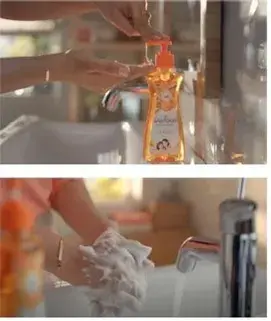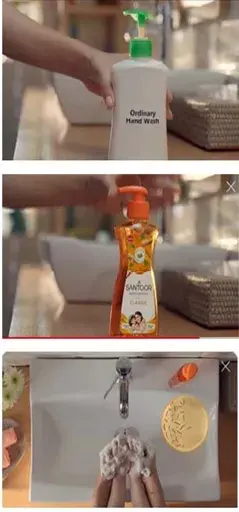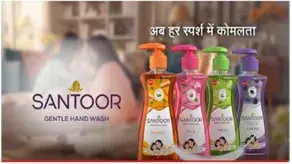By Ananyaa Banerjee and Titiksha Sinha
Introduction/Description-
Reckitt Benckiser (“Plaintiff”) had filed a lawsuit seeking a permanent injunction along-with an interlocutory injunction against Wipro Enterprises (“Defendant”) against telecasting, broadcasting and publishing their advertisement for the product “SANTOOR” claiming that it disparaged the goodwill and reputation of the Plaintiff and its product “DETTOL”.
The Hon’ble Delhi High Court dismissed the interim application in the said matter, which has brought much appreciated relevant dialogue on the limits of comparative advertising and product disparagement, which is discussed herein below in brief-
About the parties
- The Plaintiff
Reckitt Benckiser is a UK based company involved in the manufacturing of nutrition, health and hygiene products including “DETTOL” which has been in use since 1935 worldwide. - The Defendant
Wipro Consumer Care & Lighting is a leading FMCG business in personal care, home care, lighting & switches and office furniture, including brands like “SANTOOR”.
The Contentions of the Plaintiff
- The Plaintiff alleged that the Defendant launched an advertisement that disparages, denigrates and defames the Plaintiff’s well-known product “DETTOL” (hand wash) as they advertise it to be ineffective in imparting softness/moisturizing benefits to the skin, which is ex-facie denigrating and disparaging in nature, whilst being seriously injurious to the Plaintiff’s goodwill and reputation.
- Some of the features of the advertisement that disparage Dettol, as alleged by the Plaintiff are –
| Screenshot | Voice Over/Action |
 |
DAUGHTER:
Mere sath khelo Mummy.
Translation: Mummy please play with me. |
 |
[Mother shown washing hands with SANTOOR hand wash] |
 |
[Mother shown playing with her daughter] |
 |
DAUGHTER
[amazed by the softness of mother’s hands]:
So soft. |
 |
DAUGHTER:
Phir se banao.
Translation: make it again. |
 |
VOICE OVER:
Haath itne soft ki chhodne ka mann na kare.
Translation: The hands are so soft that you do not feel like leaving them.
|
 |
VOICE OVER:
Saadhaaran handwash ke muqable naye Santoor Handwash mein hai chandan ke gun jo rakhe haathon ko soft.
Translation: as compared to ordinary hand washes, Santoor Handwash has, in it, the benefits of sandal, which keeps the hands soft. |
 |
VOICE OVER:
Ab har sparsh mein komalta. SANTOOR HANDWASH.
Translation: now, softness in every touch. Santoor Handwash. |
- It is permissible for a manufacturer to compare his product with another’s, however, he crosses the line when he denigrates the latter product or claims the latter product not to have a beneficial effect which is possessed by his product, especially when the same is not true.
The Contentions of the Defendant
- The Defendant had submitted that the impugned advertisement, does not at any point, disparage or denigrate Dettol in any manner, but merely extols Santoor. All that the impugned advertisement had stated are the true properties of their product “SANTOOR” ie., comprising of sandalwood, skin softening/moisturizing properties which in no way act as an indicator that the Plaintiff’s product is harmful or lacking in any way.
- Puffery is permissible and while comparing one product with another, it is permissible to extol the product which is advertised, but not to denigrate the other product. The advertisement merely states (1) Santoor contains sandal (2) the Plaintiff’s product does not contain sandal; and (3) Sandal has skin softening properties. Therefore, all these statements are true, and permissible as per the law.
- The Defendant submits to the fact that although in the alleged advertisement, wherein an identical bottle to that of the Plaintiff’s “DETTOL” has been removed from the shelf, the advertisement is actually targeted at all products lacking natural ingredients like sandalwood.
- The usage of the term “ordinary” in the advertisement is justified by stating that when used in comparative advertising, words like “ordinary” and “common” are not meant to be derogatory rather, employed to draw a comparison between the product advertised and other similar products. Further, the time taken in replacement of the Dettol bottle with Santoor is minuscule in comparison to the overall time of the advertisement.
ISSUE IN THE PRESENT MATTER
Whether the advertisement by Wipro Enterprise for their product ‘SANTOOR’ denigrates or disparages the product ‘DETTOL’ of the Plaintiff?
FINDINGS OF THE COURT
In its analysis, the Hon’ble Delhi High Court relied upon and referred to numerous important judgements, such as Reckitt Benckiser (India) Pvt. Ltd v Hindustan Unilever Ltd (Harpic v Domex)[1],. Read article here: https://ssrana.in/articles/free-flow-commercial-information-overstepping-the-grey-area-advertising/
On the basis of the same, the Court made the following observations:
- Comparative advertising is protected under Article 19(1) (a) of the Constitution of India, subject to the exception that an advertisement must not be false, misleading or unfair.[2] Misrepresentations and falsehoods are not allowed in advertisements, and an advertisement has to be honest. The only exception to this rule is puffery, which involves inherent exaggeration, embellishment and a certain level of untruth which is only permissible due to the understanding that the average consumer does not take puffery claims seriously.[3]
- It is strictly prohibited to denigrate or belittle a rival’s or competitor’s product. While it is acceptable to assert that the advertised product is superior to the competitor’s, it is not permissible to attribute this superiority to any flaws or faults in the competitor’s product.
- A Plaintiff cannot afford to be hypersensitive, as the choice of the article which a consumer would select would depend on various factors including market forces, economic climate, nature and quality of the product. The advertisement should be seen from the point of view of a reasonable man who is a right thinking member of the general public.
- The overall effect of the advertisement has to be seen, and not frame by frame.
CONCLUSION
The Hon’ble High Court concluded that there is no direct reference to any property (positive or negative) of Dettol and the primary message that the advertisement conveys is that Santoor is superior to other similar products, as it contains Sandal.
Further, the bottle that is being replaced in the advertisement resembles Dettol, however, that merely makes up for 2 seconds of the total of 35 seconds of the video. Moreover, while the shape of the bottle is similar to Dettol, and has the similar/identical green colored lid, the actual name DETTOL is not used. Therefore, what has to be assessed is the effect of the advertisement on the consumer at one viewing and not frame by frame.
In view of the same, the interim application was dismissed, and the Hon’ble court gave critical importance to the customer’s perspective and their interests while simultaneously balancing the manufacturer’s advertising interests. As of today, the matter is still on-going, and has next been listed for April 24, 2024.
Other relevant articles-
- https://ssrana.in/articles/legality-comparative-advertisements-in-india/
- https://ssrana.in/articles/india-delhi-high-court-grants-injunction-to-gillette-india-ltd-against-reckitt-benckiser-in-a-suit-for-disparagement/
- https://ssrana.in/articles/dettol-withdraws-advertisement-claiming-soap-bars-ineffective/
[1] CS (COMM) 258/2023
[2] Dabur India Limited v Dhruv Rathee (CS 41/2023) (Refer to: https://ssrana.in/articles/critique-advertisement-disparagement-rathee-real/)
[3] Dabur India Limited v Shree Baidyanath Ayrved Bhavan Pvt. Ltd (C.S. No. 232/2022) (Refer to: https://ssrana.in/articles/striking-a-balance-between-commercial-speech-and-brand-protection-dabur-v-baidyanath/)

